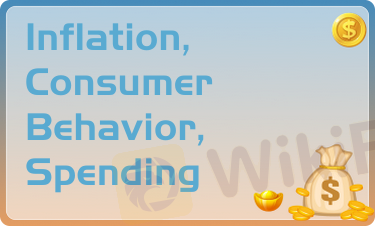
2025-02-06 06:55
業內The roles of the central bank in managing inflatio
#firstdealofthenewyearastylz
The impact of inflation on consumer behavior is a crucial topic in economics that examines how rising prices influence the decisions and actions of consumers. Here’s a full discussion on it:
1. Understanding Inflation: Inflation is the rate at which the general level of prices for goods and services rises, eroding purchasing power. When inflation occurs, consumers find that their money does not stretch as far as it once did, leading to changes in spending habits.
2. Changes in Spending Habits: As prices increase, consumers may prioritize essential goods and services over luxury items. For example, they might cut back on dining out or entertainment expenses and focus more on necessities like groceries and housing. This shift can lead to decreased demand for non-essential products, impacting businesses that rely on discretionary spending.
3. Impact on Savings and Investment: High inflation can also discourage saving, as the real value of money decreases over time. Consumers might feel compelled to spend their money quickly rather than save it, fearing that it will lose value. This behavior can lead to a decrease in overall savings rates and affect investment trends, as individuals may seek to invest in assets that can outpace inflation, such as real estate or stocks.
4. Consumer Confidence: Inflation can influence consumer confidence and expectations about the economy. If consumers anticipate continued price increases, they may alter their spending behavior, leading to a self-fulfilling prophecy where reduced spending can slow economic growth. Conversely, if inflation is perceived as temporary, consumers may be less likely to change their habits significantly.
5. Long-Term Effects: Over the long term, persistent inflation can lead to structural changes in the economy. Businesses may adjust their pricing strategies, and wage negotiations may shift as workers demand higher pay to keep up with rising costs. This can create a cycle of inflation that is difficult to break, affecting overall economic stability.
In conclusion, inflation has a profound impact on consumer behavior, influencing spending habits, savings, investment decisions, and overall economic confidence. Understanding these dynamics is essential for businesses and policymakers to navigate the challenges posed by inflation effectively.
贊 0

Monix
ブローカー
熱門討論
業內
哎,现在明白不赌就是赢啊
行情分析
美元/加元技术面
技術指標
外汇技术分析之波浪理论
業內
[活動]論交易,贏取200元話費補貼
技術指標
EZ.Fury Kite是基于趋势指标MA进行判断
技術指標
指标派是什么?
市集分類

平臺

展會

代理商

招聘

EA

業內

行情

指標
The roles of the central bank in managing inflatio
 香港 | 2025-02-06 06:55
香港 | 2025-02-06 06:55#firstdealofthenewyearastylz
The impact of inflation on consumer behavior is a crucial topic in economics that examines how rising prices influence the decisions and actions of consumers. Here’s a full discussion on it:
1. Understanding Inflation: Inflation is the rate at which the general level of prices for goods and services rises, eroding purchasing power. When inflation occurs, consumers find that their money does not stretch as far as it once did, leading to changes in spending habits.
2. Changes in Spending Habits: As prices increase, consumers may prioritize essential goods and services over luxury items. For example, they might cut back on dining out or entertainment expenses and focus more on necessities like groceries and housing. This shift can lead to decreased demand for non-essential products, impacting businesses that rely on discretionary spending.
3. Impact on Savings and Investment: High inflation can also discourage saving, as the real value of money decreases over time. Consumers might feel compelled to spend their money quickly rather than save it, fearing that it will lose value. This behavior can lead to a decrease in overall savings rates and affect investment trends, as individuals may seek to invest in assets that can outpace inflation, such as real estate or stocks.
4. Consumer Confidence: Inflation can influence consumer confidence and expectations about the economy. If consumers anticipate continued price increases, they may alter their spending behavior, leading to a self-fulfilling prophecy where reduced spending can slow economic growth. Conversely, if inflation is perceived as temporary, consumers may be less likely to change their habits significantly.
5. Long-Term Effects: Over the long term, persistent inflation can lead to structural changes in the economy. Businesses may adjust their pricing strategies, and wage negotiations may shift as workers demand higher pay to keep up with rising costs. This can create a cycle of inflation that is difficult to break, affecting overall economic stability.
In conclusion, inflation has a profound impact on consumer behavior, influencing spending habits, savings, investment decisions, and overall economic confidence. Understanding these dynamics is essential for businesses and policymakers to navigate the challenges posed by inflation effectively.
贊 0
我也要評論
提問
0條評論

還沒人評論,趕緊搶佔沙發

提問
還沒人評論,趕緊搶佔沙發